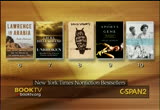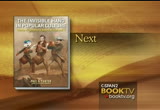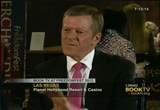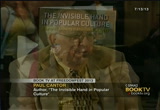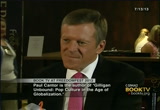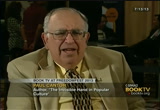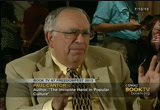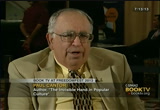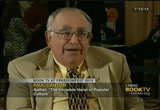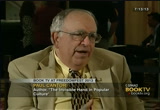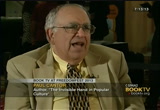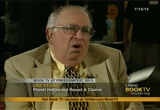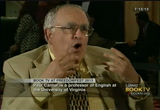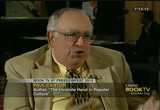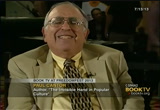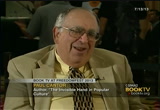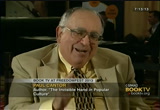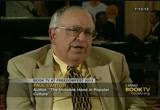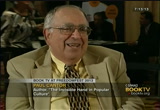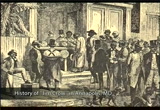tv Book TV CSPAN August 25, 2013 1:20pm-1:41pm EDT
1:20 pm
1:21 pm
television shows of the past decade. this is 20 minutes. >> and now on book tv we want to introduce you to university of virginia professor paul cantor who is also an author. professor, before we get into your most recent book, what do you teach at the university of virginia? >> guest: i teach world literature all the way from homer. i teach a course called fiction vampire. kipling, all the books that came out of the british empire. a lot of different things. also shakespeare. mostly about shakespeare. >> host: can you make connections between all of those? >> guest: that is my perfection -- profession. >> host: what is one of the connections that you make? >> guest: i am generally interested in politics and how
1:22 pm
people perceive politics. these things go all the way from homer to the american western. so i have an essay that compares the great trilogy. and they're both stories about revenge the stories the restore the boundaries between civilization, barbarism. i'm really interested in how things change over time. you can do wonderful comparisons. you take the same subject and look at a greek strategy and an american western movie. >> host: your newest book is called the invisible hand in popular culture. what are you attempting to do? >> guest: i am examining the issue of freedom and american popular culture, and i am particularly interested in the debate between liberty and
1:23 pm
authority. a great debate that is gone throughout politics from the one in the united states. >> host: professor kanter, when i read your rights to film or a director directs one, are they looking at larger issues besides just an entertainment vehicle? >> guest: i don't have a simple rule for that. sometimes we are. he is a very serious author. in other cases i think it's more the look of the draw that the show ends of coming over seriously. there were libertarians. i am open to any possibility. sometimes the authors are deliberately doing things and sometimes they're not. >> host: well, when it comes to deadwood what is the author's motive?
1:24 pm
>> guest: his team was what he called order. he's very interested in the way social institutions developed spontaneously. he was interested in deadwood because this was a town which for various reasons is outside any government jurisdiction. and it does produce a lot of violence. a lot of dangerous things. what he wanted to show was help people of their own free will and on their own efforts to set up institutions. for example, even in the absence of government they're able to establish property rights. this very mike -- very much like john locke. the second treatise of government. trying to bring together the aspects of philosophy and high culture, the things that i think unjustly i thought of as having no culture today. >> host: well, speaking of -- pardon me, low culture, you have written about it gilligan's
1:25 pm
island in a previous book. >> guest: yes. i offered gilligan's island as a microcosm of american democracy. examine the various claims to rules, well off, the skippers military presence, the professors intelligence, and it showed with gilligan, a man without prowess, he really was representative of america. there really thrilled. that was what he was trying to do. >> host: was a reflective of the era of the early 60's? >> guest: absolutely. back in washington, seeing how many cold war themes were in it. there was an episode about russian cosmonauts. there were several episodes about missiles that could raise to the moon. go back and see how these shows do reflect the time. >> host: back to your newest
1:26 pm
book, the invisible hand -- "the invisible hand in popular culture", who was director edgar olmert? >> guest: he is one of those guys that was forgotten during his own lifetime and now has been brought back. he was an immigrant from the austria and varian empire. he is called the king. he could be the greatest horror movie ever. he made one of the most famous film noir movies. and i use an example of how pop culture intersects with high culture. he was a very well educated man. he lived with some of the great european directors, and he ended up working what is called poverty role in hollywood churning out cheap movies the title and in may something out. did he made something of it.
1:27 pm
they discovered him in the 1950's and made a hero. left his movies as a child. >> host: what about star trek. >> guest: that is a chapter that is actually on the tv show. from ab of discovery that he had written to 24 episodes of this wonderful show. i went into it totally objective. i want to say -- see if i could find anything in this series. it turns out a lot of the genesis of star trek is in that series. the euro in the show must go around and encounter these strange towns. then have to straighten them out that became the prototype for the enterprise going to these plants grow by theocrats and evil dictators. i was very interested to see the continuity there. >> host: professor paul
1:28 pm
cantor, we are here at freedom fest, libertarian gathering in las vegas. the subtitle of your book is liberty verses authority. what is your message here? >> guest: well, my message is that libertarians and can help us understand a culture, including populist culture. for a long time popular culture, the study of popular culture was the preservation of marxism and the left. i tried to show that people of a libertarian perspective can have interesting things to say about popular culture and can often find libertarian things in popular culture. southmark is the best example. but i try to find ways in which libertarian take comes up in american pop culture. >> host: what about the western? >> guest: well, there is a perfect example of the conflict between liberty and authority.
1:29 pm
treat older the people as if they cannot take care of themselves. come into a small town, run by a corrupt mayor. some kind of group of businessmen. and he says straighten it out. to me there is a kind of paternalism and that. the contrast that deadwood, the sense that people can take care of themselves. not had a complete loss. what i call a perspective. left of themselves people end up in a moral argument. they develop on their own. i found it fascinating out that plays out in the american western. >> host: you see examples in hollywood and popular culture of the social utopianism and authority?
1:30 pm
>> guest: absolutely. also distal pianism, showing that utopia can turn out to be very bad. i talk about a lot of alien invasions. many of them, there was one about two or three seasons. aliens showed up promising utopia. a very strange, promising universal health care, green energy and public-works projects. it got people concerned that somehow this was a comment on the obama administration. anyway, this is the kind of fallacy that people would give away their freedom for the sake of this material utopia. ..
1:31 pm
>> guest: you know, there's a danger, but i don't see the harm that would be done. i have an introduction that discusses the book and explains why, in fact, a model of intention is a little naive. very often we have the notion that there's a single author who must have everything planned out in advance. one thing identify learned -- i've learned about television particularly, but movies as well, is they are collaborative ventures, and the whole is greater than the sum of the parts. writers, we have the fiction that a tv show's written by the one writer who gets the screen credit. in fact, as with movies, whole teams write these shows, and i've talked to some writers.
1:32 pm
they play off each other. they don't go into it knowing what they're doing or having a full developed attention, but by the time they're through, they have developed a work of art that has intentionality. that's my decision. that may sound too scholarly, but i think a work have been intentionality without a single person having a single person in creating it. if it holds together as a work of art, i'm happy. >> host: in preface you write america was born in a rebellion and its popular culture has embraced that ever since. >> guest: yeah, and i think that's true. that's why many cultural elitists don't like popular culture. they find it unruly and rebellious, and one of my themes is op lahr culture is itself an expression of american freedom. sure, a lot of it's garbage, but i love american popular culture because i think it is best, it's very great art, and it reflects
1:33 pm
this wonderful spirit of independence that america was founded on. >> host: paul cantor with a television show, a popular culture show today that you're walking regularly? >> guest: the walking dead. >> host: why? >> guest: i'm now into zombies. for years i resisted zombies, but people kept saying you've got to watch show, and many of my analyses are of shows that present disasters; the government falls apart, society falls apart. and zombie matters are like that. and once again they split along these lines. this movie world war z does not suggest people are helpless and they have to resort to this -- in this case to the u.n. and to scientists and to military special forces and brad pitt, all these elitist things. yet the walking dead is just the opposite. it shows a world in which people when they fall back on their own resources do very well. it's a horrifying situation, but they grow, they find -- they
1:34 pm
rise to the challenge. i really like that spirit in the show. it's also just very well written and very well cast. >> host: were you able to talk to hollywood directors, hollywood writers about their work? >> guest: you know, it's very hard to reach these people. i did -- vince gill began who does "breaking bad," another one of the best shows on television, he came to shawsville for the film festival. i am the director of the film festival, there was a kind of private meeting arranged, it was wonderful. and i have to tell you, a real artist. all those things that happen are planned out. he was able to tell us what color scheme he planned for the whole season. these people don't like to say they're artists, they don't like to have to be responsible to a critical public in that -- but most of them are really very, very talented and as talented as the great novelists or playwrights we looked to in the
1:35 pm
past. >> host: the effect of 9/11 on popular culture. >> guest: well, that's a big question that i deal with in the last section of this book. on one level it's very interesting to see that all the predictions about 9/11 and its affect on culture proved untrue. people at the time said we're going back to world war ii movies, we're going to have patriotism, the old style american herely. there was a little bit of that -- hero. there was a little bit of that, but, in fact, and people said we won't have shows that are skeptical about the government anymore. now, we're talking fall of 2001. people particularly said "the "x-files"" is finished. and, indeed, it went off in the spring of 2002. but i defend the "x-files" as a show that in its last episode it really took a critical stance with regard to the war on
1:36 pm
terror. it really raised, i think, very important issues about how the erosion of civil liberties. and also in its spin-off, "the lone gunman," it had actually predicted 9/11, the most uncanny thing, i think, in the history of television. in march 2001 the debut of the show "the lone gunman," it was about terrorists running a boeing plane into the world trade center. i mean, the cia and fbi were interviewing these guys a couple of months later. it was just a coincidence, but i felt it showed how much that the "x-files" and the spin-offs that anticipated the problem was a conspiracy theory. and in general very quickly shows went back to, i think in a healthy way, raise questions about the militarization of the police in the united states, the whole obsession with homeland security. "fringe" is a great show about that. i discuss "fringe" at length in the last chapter. i think that was a fascinating
1:37 pm
reaction to 9/11. in fact, it imagines that a parallel universe in which 9/11 did not happen. and the u.s. turns out to be more militarized in that universe, if you can belief it. >> host: could you write an entire book about the harry potter series based on your themes? >> guest: i suppose i could, but i'm going to have to confess that i don't know the harry potter books or the movies. i have a certain confidence in myself that i could work up something on it, but, you know, i have to explain to people you can't do everything. i haven't read every book, i haven't seen every movie or television show. but a friend of mine did a wonderful essay on toll key yen and the harry potter shows and the whole fascination with wizards. i think i could come up with something. >> host: and finally, professor cantor, if you could describe the cover of your book. >> guest: well, the cover was an attempt to show the continuity between american patriotism and
1:38 pm
spirit of independence and popular culture today. so we have a famous, iconic image from 1776, and then we have john wayne and william shatner and then someone who is not eric coughlin. bears a slight resemblance, but is not eric coughlin for legal reasons. but we thought that captured the spirit of the book, showing that american popular culture has its roots in 1776. >> host: and paul cantor is the author of this book, "the invisible hand in popular culture: liberty versus authority in american film and tv." thank you for joining us. >>ing -- >> guest: well, thank you for having me here. it was a great pleasure. >> this was a town with slavery throughout the colonial period and up until emancipation. but i didn't want realize how bad the jim crow movement had been after the war in the early
1:39 pm
1900s. and that i found a real shock. annapolis was one of the two cases decided by the supreme court of the united states in 1915 for the grandfather clause. if you, if you've googled grandfather clause, you get grimm v. oklahoma. and be this is an oklahoma case that deals with some restrictions on voting. in that case as well was a case involving a law passed in 1908 by the maryland legislature changing a charter of the city of annapolis to restrict voting by african-americans. now, they're free, and they've been voting. and they're applied only to the city, not to state elections. they tended to vote republican, so democrats in power in the state government and in the city wanted to restrict this. you couldn't vote in annapolis
1:40 pm
under this 1908 law unless you had $500 worth of assessed property in the city, unless you were naturalized or you were the son of a natural -- of course, no women voting at all in 1908, so it doesn't matter -- unless you're the son or descendant of a naturalized citizen, or unless your grandfather could have voted in january 1, 1868. well, in 1868 voting in annapolis is tied to the 1867 constitution of maryland which allowed voting only to males, white males. so if your grandfather wasn't a white male and couldn't vote, you couldn't vote. no matter the 15th amendment in 1870 in annapolis. if you couldn't vote in 1868, you couldn't vote in 1908. >> more about
76 Views
IN COLLECTIONS
CSPAN2 Television Archive
Television Archive  Television Archive News Search Service
Television Archive News Search Service 
Uploaded by TV Archive on

 Live Music Archive
Live Music Archive Librivox Free Audio
Librivox Free Audio Metropolitan Museum
Metropolitan Museum Cleveland Museum of Art
Cleveland Museum of Art Internet Arcade
Internet Arcade Console Living Room
Console Living Room Books to Borrow
Books to Borrow Open Library
Open Library TV News
TV News Understanding 9/11
Understanding 9/11